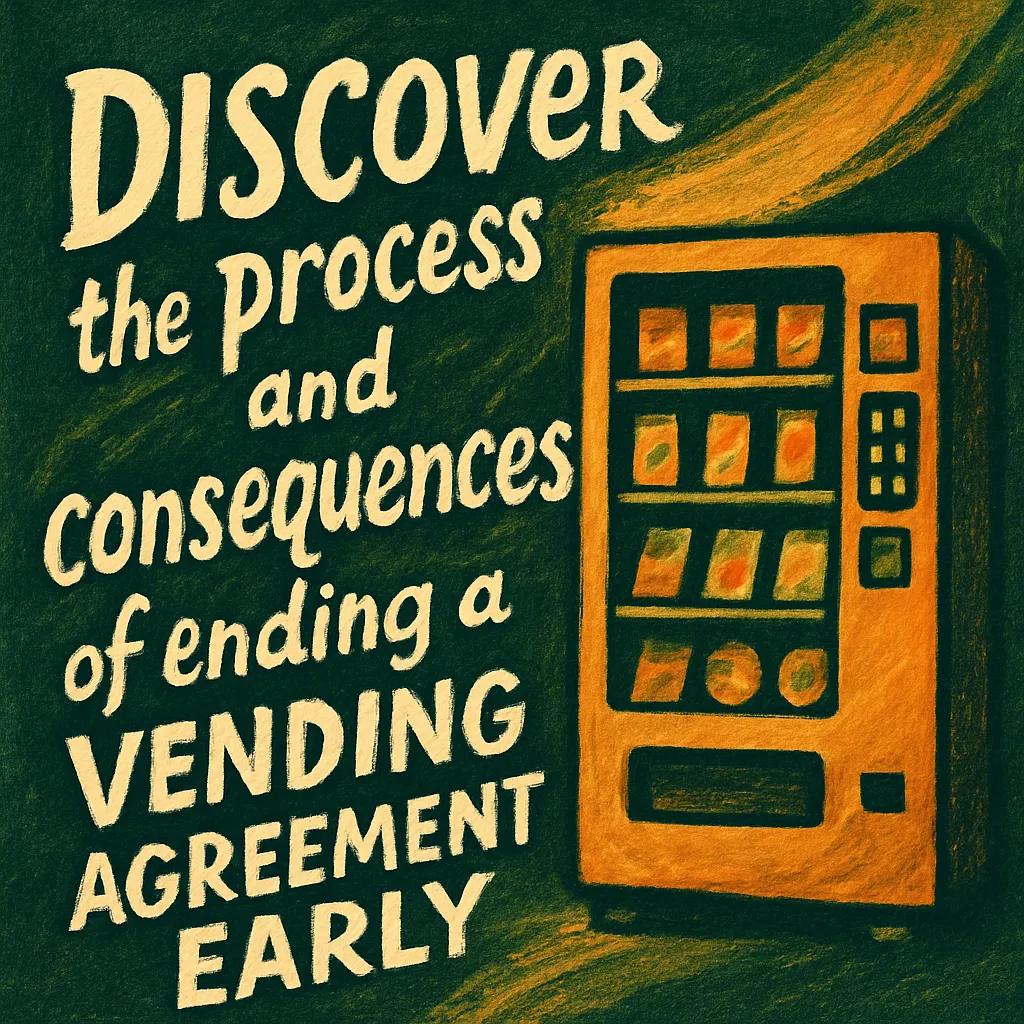Early Termination of Vending Contracts
Discover the process and consequences of ending a vending agreement early.
Back to Vending Contracts ResourcesDiscover the process and consequences of ending a vending agreement early.
Back to Vending Contracts ResourcesBefore making any decisions, it’s crucial to thoroughly understand the terms of your current vending agreement regarding early termination. This knowledge empowers you to explore options and minimize potential repercussions.
![]() Review specific clauses on termination, notice periods, and fees.
Review specific clauses on termination, notice periods, and fees.
![]() Identify conditions for breach of contract that might justify early exit.
Identify conditions for breach of contract that might justify early exit.
![]() Prepare for negotiation with a clear understanding of your position.
Prepare for negotiation with a clear understanding of your position.

Entering a vending contract establishes a clear agreement for services. However, business needs change, and circumstances can arise where early termination becomes a consideration. Understanding the implications and processes involved is crucial for a smooth transition and to avoid unnecessary costs or disputes.
Businesses explore early termination for various reasons. These often include dissatisfaction with service, such as inconsistent stocking, frequent machine malfunctions, or a lack of responsiveness from the vending provider. A significant decline in usage or a change in office policy might also make a contract no longer viable. In some cases, a business might simply be relocating or downsizing, making the existing vending agreement impractical.
The distinction between a "breach of contract" and "unilateral termination without cause" is critical. A breach occurs when one party fails to uphold its obligations as defined in the contract. For instance, if the provider consistently fails to service machines or stock agreed-upon products, this could constitute a breach. In such cases, the contract typically outlines steps for notice and resolution, potentially allowing termination without penalty. Always make sure to document any issues thoroughly.
Conversely, terminating a contract without a demonstrable breach often triggers specific clauses related to early termination fees or liquidated damages. These fees are designed to compensate the vending provider for lost revenue and are usually stipulated within the agreement. Before making any decisions, it's wise to review how vending contracts work in general and understand common clauses in vending contracts.
Regardless of the reason, the process for early termination usually involves several steps:
Carefully managing the early termination of a vending contract can help ensure a smooth transition while safeguarding your business interests. For a deeper understanding of legal aspects, consider reviewing a case study on vending contract negotiation.
Common reasons include breach of contract by either party (e.g., poor service, lack of sales), relocation of the business, or mutual agreement due to changing needs.
Many vending contracts include clauses for early termination fees or liquidated damages, especially if the termination is not due to a breach by the vending service provider.
Carefully examine sections related to 'Term and Termination,' 'Default,' 'Remedies,' and 'Liquidated Damages.' Look for notice periods and any specific conditions for ending the agreement.
A material breach is a significant violation of the contract's terms that undermines the entire agreement. Examples include a vendor failing to maintain machines or consistently stock popular items, or a business failing to provide agreed-upon access.
Negotiation is often possible, especially if there's a demonstrable issue with service or a significant change in business operations. Open communication with the vending provider is key.
First, review your contract. Then, document any issues, gather evidence if there's a breach, and formally notify the vending provider in writing according to the contract's specified notice period.
If the termination is amicable or justified by vendor non-performance, it's unlikely to cause problems. However, a contentious termination might be noted by some providers, so strive for a professional resolution.
Typically, the vending service provider is responsible for machine removal. The contract should specify removal timelines and conditions.
Longer-term contracts often have more stringent termination clauses and higher penalties than shorter-term or month-to-month agreements.
For complex situations or if significant penalties are involved, consulting legal counsel can help ensure you understand your rights and obligations and avoid potential litigation.